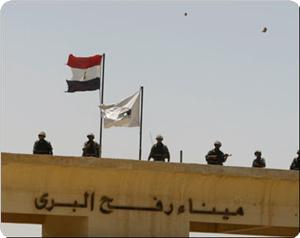Mustapha Suleiman, 27, from J Block east of the Rafah crossing with Egypt, crosses through gaps in the iron fence on the border carrying bread, water, meat cans and a handful of vegetables for Egyptian soldiers stationed on the other side.’Whatever you offer on Saturday you will receive on Sunday,’ Suleiman says. ‘I am ready to help with what I have, for all the work they do.’
Egyptian troops have run short of essential supplies, caught up in clashes involving Bedouin groups. Serious clashes have erupted between riot police and Bedouin groups over the past two weeks.
Supplies sent for Egyptian troops have not got through to them. The troops have appealed to people living in El-Arish town on the Egyptian side for help. And for troops on the Gaza border, help has come from Gazans – themselves on small rations as a result of the Israeli blockade.
‘We heard the Egyptian soldiers calling out to us, saying they had run out of food,’ a policeman in Gaza told IPS. Gazans are now ‘sharing their limited food with Egyptian soldiers.’
Many people can be seen crossing the ‘Philadelphia Corridor’ that separates Egypt from the Gaza Strip, carrying food and essential supplies. They find enough gaps in the fence and wall built before the Israeli withdrawal from Gaza in 2005.
Some of the supplies being offered to Egyptian troops have earlier come in from the Egyptian side to Gaza through the underground tunnels. ‘We overcome our Gazan hurdles under the ground, and when Egyptians need us we will overcome their hurdles above the ground,’ Wael Al-Nasri who owns a tunnel tells IPS.
Most tunnels have a shared ownership between Egyptian and Gazan partners. The tunnels are now beginning to see a movement in the opposite direction. Al-Nasri says he recently sent bags of flour back to his partner on the Egyptian side. In the face of clashes, it isn’t just the Egyptian army that is running short of food.
‘They have always been there for us these past five years during the Israeli siege of Gaza,’ says Al-Nasri. ‘They help us to stand tall, so we help them.’
Al-Nasri picked up the bags from a shop owned by Mohammed Qishta, to whom he had sold them earlier. Qishta parted with them readily. He has relatives on the Egyptian side, and says there is a scarcity on that side because of ‘new road blocks set up by violent thugs and armed groups.’ Many other dealers are sending goods back to Egypt through the tunnels, he says.
The Palestinian government in Gaza is trying to restrict the outflow of essential goods such as flour and oil, says Qishta. If the flow of Egyptian goods through Sinai on the other side of Gaza comes to a halt, Gaza itself will be hit.
Some tunnel traders are reporting a surge in the demand for light weapons in the face of the worsening security situation on the Egyptian side. Few are prepared to talk about this openly. But this has continued in the past, and many cases have been reported of Egyptian authorities confiscating arms being smuggled through these tunnels.
There seems no indication at present of light weapons being sent to the Egyptian side. But the market price for some weapons is said to have risen. ‘A Kalashnikov used to cost 400-500 Jordanian dinars (560-700 dollars) before the unrest,’ says Al-Nasri. ‘The price has now doubled. In the lack of security many families who trade through tunnels on the Egyptian side need extra weapons.
Clashes are meanwhile continuing. Firing is heard every now and then in the Sinai area. There have been reports of heavy bombing as well, and of an attempt to blow up a gas pipeline that supplies Israel. There is little detail because media are unable to reach most of Sinai area from Cairo to the West, or from Gaza in the east.

